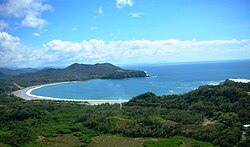Puerto Carrillo
Puerto Carrillo | |
|---|---|
 Aerial view of Carrillo | |
 Puerto Carrillo district | |
 Puerto Carrillo Puerto Carrillo district location in Costa Rica | |
| Coordinates: 9°55′30″N 85°26′37″W / 9.9250378°N 85.4435498°WCoordinates: 9°55′30″N 85°26′37″W / 9.9250378°N 85.4435498°W | |
| Country | |
| Province | Guanacaste |
| Canton | Hojancha |
| Creation | 23 July 1999 |
| Area | |
| • Total | 76.75 km2 (29.63 sq mi) |
| Elevation | 40 m (130 ft) |
| Population (2011) | |
| • Total | 1,574 |
| • Density | 21/km2 (53/sq mi) |
| Time zone | UTC−06:00 |
| Postal code | 51103 |
Puerto Carrillo is a district of the Hojancha canton, in the Guanacaste province of Costa Rica.[1][2]
History[]
Puerto Carrillo was created on 23 July 1999 by Decreto Ejecutivo 28027-G. Segregated from Hojancha.[2]
Geography[]
Puerto Carrillo has an area of 76.75 km²[3] and an elevation of 40 metres.[1]
Situated along the Pacific Coast of Costa Rica's Guanacaste Province, Puerto Carrilo is a jewel among Costa Rica's Pacific beaches. The town itself is very small (less than 500 full-time residents) and is predominantly a sport-fishing village with a handful of nice hotels, restaurants, two small food markets, and tour operators. While there are only a limited number of hotels and places to eat in Carrillo, many options are available in the nearby town of Samara, just 4 km away. The population in Carrillo is mainly local residents and still maintains an authentically Costa Rican atmosphere. The district has a population of around 1,800 people.[4]
Economy[]
Tourism[]
Puerto Carrillo is a small unobtrusive community that has been playing host to some of the most well renown sport fishing boats in the world, since its discovery as a billfish destination over 15 years ago. The tiny harbor affords protection to a small handful of charter and private boats that are here on permanent bases. The beautiful white sand beach has small waves most of the time, and is popular with swimmers and families with kids. Playa Carrillo is never crowded, and it offers nice picnic areas right on the beach. Your car will be within easy reach, wherever you decide to spend your day in the sand.
Carrillo also offers beautiful and secluded small beaches near by, El Roble is a rocky beach with its own waterfall and tide pools. Playa El Sur, beautiful medium size beach surrounded by palm trees (only accessible by boat). Playa Samara, 4 km to the north, is a much larger beach. with waves generally near knee to waist high, and is a popular place for beginning surfers and families.
Demographics[]
| Historical population | |||
|---|---|---|---|
| Census | Pop. | %± | |
| 2000 | 1,287 | — | |
| 2011 | 1,574 | 22.3% | |
|
Instituto Nacional de Estadística y Censos[5] |
|||
For the 2011 census, Puerto Carrillo had a population of 1,574 inhabitants.[7]
Transportation[]
Road transportation[]
The district is covered by the following road routes:
Carrillo is located approximately 41 km (25 mi) from Nicoya, the economic and administrative hub of the region. Access to Carrillo is via paved roads. The paving of the "Road 150" from[Nicoya through Sámara to Carrillo was completed in early 2006, which greatly increased the accessibility of the region and dramatically reduced driving times. The total drive now takes about 4 hours from San Jose's Juan Santamaría International Airport (SJO) and under 2 hours from Liberia's Daniel Oduber International Airport (LIR). Public buses operate between nearby Sámara and Nicoya several times a day; express buses operated by Empresa Alfaro also connect Sámara with San José usually twice a day (except weekends).
Air service was provided by Sansa Airlines to the adjacent Carrillo Airport. The airport is no longer used by Sansa Airlines. The airport is used by the Costa Rican government, Fuerza Publica, private charters and The Flying Crocodile ultralite flyers.
Villages[]
Administrative center of the district is the village of Puerto Carrillo.
Other villages in the district are Angostura, Arbolito, Cuesta Malanoche, Estrada Rábago, Jobo, Lajas, Quebrada Bonita (partly), San Miguel and Santa María.
Gallery[]

Aerial photo of Carrillo Beach

Carrillo Beach

Carrillo Beach Sunset

Carrillo Beach Sunset

Spinner dolphins right off the coast of Carrillo

Fire rainbow right off the coast of Carrillo

Stripe marlin right off the coast of Carrillo

Humpback whale fluking right off the coast of Carrillo

References[]
- ^ Jump up to: a b "Declara oficial para efectos administrativos, la aprobación de la División Territorial Administrativa de la República N°41548-MGP". Sistema Costarricense de Información Jurídica (in Spanish). 19 March 2019. Retrieved 26 September 2020.
- ^ Jump up to: a b División Territorial Administrativa de la República de Costa Rica (PDF) (in Spanish). Editorial Digital de la Imprenta Nacional. 8 March 2017. ISBN 978-9977-58-477-5.
- ^ "Área en kilómetros cuadrados, según provincia, cantón y distrito administrativo". Instituto Nacional de Estadística y Censos (in Spanish). Retrieved 26 September 2020.
- ^ Estadísticas Vitales 2013 Archived 2015-04-02 at the Wayback Machine - INEC
- ^ "Instituto Nacional de Estadística y Censos" (in Spanish).
- ^ "Sistema de Consulta de a Bases de Datos Estadísticas". Centro Centroamericano de Población (in Spanish).
- ^ "Censo. 2011. Población total por zona y sexo, según provincia, cantón y distrito". Instituto Nacional de Estadística y Censos (in Spanish). Retrieved 26 September 2020.
External links[]
- Districts of Guanacaste Province
- Populated places in Guanacaste Province
- Costa Rica geography stubs










